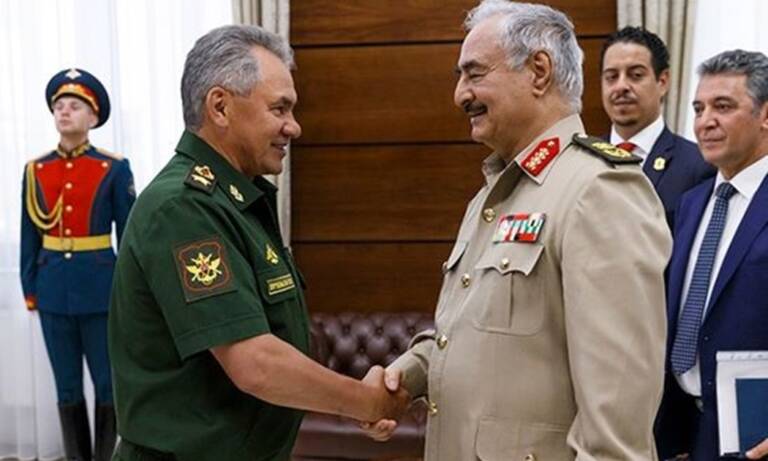Libya: the army’s intervention replaces that of Wagner, in an extremely uncertain context

- Moscow is consolidating Wagner Group operations in Libya under the direct control of the Main Directorate of the General Staff of the Russian Armed Forces (GRU) and relying on the African Corps under the supervision of the Russian Deputy Defense Minister. Therefore the collaboration between the government of General Khalifa Haftar does not cease to cooperate with Moscow, only the counterparts on which Tobruk must agree change, as reported by the Jamestoown institute
- In fact, Libyan contacts passed from the Wagner group to the official authorities in Moscow, especially with the secret services. Indeed, the GRU, the military secret service of the Russian Federation, is preparing important strategic military exercises in Libya through military operations aimed at gaining influence in the Mediterranean. All this despite the warnings sent by Washington about this dangerous collaboration.
Libya's crisis-ridden government has offered a path for greater Russian influence in the oil-rich country since 2018. With the passing of Wagner chief Yevgeny Prigozhin in August 2023, Moscow began consolidating the Wagner Group's operations in Libya under direct control of the Main Directorate of the General Staff of the Russian Armed Forces (GRU). The Kremlin's moves have important political and military implications. At least 800 Russian contractors are currently in Libya, supported, when necessary, by up to 1,000 Syrian militiamen based in Benghazi.
Eastern Libya (Cyrenaica) and southwestern Libya (Fezzan) are currently under the authority of the Libyan House of Representatives. The Tobruk-based legislative body is dominated by Field Marshal Khalifa Haftar and his Libyan National Army (LNA), which is more a collection of militias and mercenaries than a “national army”. Haftar, a US citizen and former Central Intelligence Agency (CIA) asset, is supported by Russia, the United Arab Emirates and Egypt, although Cairo's support is waning due to Haftar's support for the Rapid Support Forces of Sudan. In opposition to the Libyan House of Representatives and the LNA is the internationally recognized Government of National Unity (GNU), based in Tripoli and with the support of Qatar, Italy and Turkey. Without a national President, the functions of the Head of State are carried out by the Allied High Council of State.
Wagner supported Haftar's failed attempt to take Tripoli in 2020. Many of Wagner's fighters were inexperienced and performed poorly on the front lines, creating tensions with LNA commanders and Haftar, who delayed payment to the group (Libya Observer, 14 May 2020). An October 2020 ceasefire allowed the redeployment of some Wagner personnel, including Syrian mercenaries, to Mali and Ukraine (Libya Observer, March 22, 2022).
After the collapse of the LNA/Wagner offensive, Moscow informed the GNU in Tripoli that it now supports UN efforts to promote fair elections for a unity government (Libya al-Ahrar, December 7, 2023). The newly reopened Russian embassy in Tripoli is led by Ambassador Aydar Rashidovich Aganin, a Muslim Tatar (Libya Observer, February 22). The opening of a Russian consulate in Benghazi, expected by the end of the year, has met with opposition from the GNU (Libya al-Ahrar, February 10; Agenzia Nova, February 23).
Although he was warned by an American delegation that cited a Russian risk to public security, Haftar held talks in Moscow with Russian President Vladimir Putin and Russian Defense Minister Sergei Shoigu in September 2023 (unverified reports have suggested that Hafter was seeking to obtain air defense systems, pilot training, and special forces training in exchange for upgrades to air bases previously used by Wagner, so that they would be more suitable for use by Russian military personnel ( Libya Security Monitor, ) (Libya Observer, 11 November 2023).
Docking rights for Russian warships at a Libyan port were also considered, although a source close to Haftar denied these were part of the talks The most likely location for a Russian naval base would be the deep-water port of Tobruk, a significant improvement over Russia's modest Mediterranean naval facilities at Tartus and Latakia in Syria.
Haftar continues to meet with American military and state officials, although this may only provide him with leverage in his dealings with the Russians, who do not appear to oppose his plan to establish his family as a ruling dynasty. The meetings with American officials, however, could also raise suspicions in the Russian camp, which considers Haftar useful but not irreplaceable. Furthermore, Russian forces have proven to be anything but invincible in Libya, indeed their actions in the past have been contained.
A problem for Italy, a sensational demonstration of the weakness of the USA
If Russia managed to set foot in the port of Tobruk, this would constitute a considerable problem for Italy, with an additional nuclear power on its doorstep, even if the Russian fleet in the Mediterranean and Black Seas has not proven to be an insurmountable threat . It would be different if modern air forces or even nuclear deterrents were introduced.
All this is the consequence of a series of sensational errors in the management of the Libyan quadrant by Washington since 2011, with the dismissal of Gaddafi, and which have continued until now. The USA was succumbed to Paris which acted in its own selfish interests, and now everyone is paying the consequences.

Thanks to our Telegram channel you can stay updated on the publication of new Economic Scenarios articles.
The article Libya: the army's intervention replaces that of Wagner, in an extremely uncertain context comes from Economic Scenarios .
This is a machine translation of a post published on Scenari Economici at the URL https://scenarieconomici.it/libia-lintervento-dellesercito-si-sostituisce-a-quello-della-wagner-in-un-quadro-estremamente-incerto-1/ on Sun, 17 Mar 2024 16:25:33 +0000.
